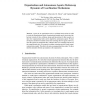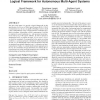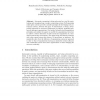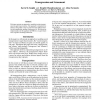146
click to vote
ATAL
2008
Springer
15 years 3 months ago
2008
Springer
Agents in an organization need to coordinate their actions in order to reach the organizational goals. Organizational models specify the desired behaviour in terms of roles, relati...
138
click to vote
ATAL
2008
Springer
15 years 3 months ago
2008
Springer
Multi-issue negotiation protocols represent a promising field since most negotiation problems in the real world involve multiple issues. Our work focuses on negotiation with inte...
159
click to vote
ATAL
2008
Springer
15 years 3 months ago
2008
Springer
The aim of this paper is to provide a logical framework for the specification of autonomous Multi-Agent Systems (MAS). A MAS is autonomous in so far as it is capable of binding (...
155
click to vote
ATAL
2008
Springer
15 years 4 months ago
2008
Springer
Abstract. Autonomic computing is being advocated as a tool for maintaining and managing large, complex computing systems. Self-organising multi-agent systems provide a suitable par...
143
click to vote
ATAL
2008
Springer
15 years 4 months ago
2008
Springer
In the last 10 years several approaches and technologies other than MAS (such as Web services and Grid computing) have emerged, with the support of the industry, providing their o...
151
Voted
ATAL
2008
Springer
15 years 4 months ago
2008
Springer
This paper presents an approach to modeling social transgressions in agent based systems. The approach is intended to be abstract enough that it may be used with many different th...
167
click to vote
ATAL
2008
Springer
15 years 4 months ago
2008
Springer
In open multi-agent systems (MASs) we cannot assume agents to be developed in a centralized fashion. Recent proposals of commitmentbased communication frameworks aim at increasing ...
126
click to vote
ATAL
2008
Springer
15 years 4 months ago
2008
Springer
The IST-CONTRACT project is in the process of creating an electronic contracting language. One of the goals of this language is that it has formal underpinnings, and formalization...
135
click to vote
ATAL
2008
Springer
15 years 4 months ago
2008
Springer
In this paper we present a hybrid reputation model focused on organizational structures that attempts to solve problems associated with both centralized and decentralized reputatio...
125
click to vote
ATAL
2008
Springer
15 years 4 months ago
2008
Springer
In multi-agent applications, normative systems are usually used to regulate the behavior of the agents. They provide an efficient means to ensure limited deviations from an expecte...




